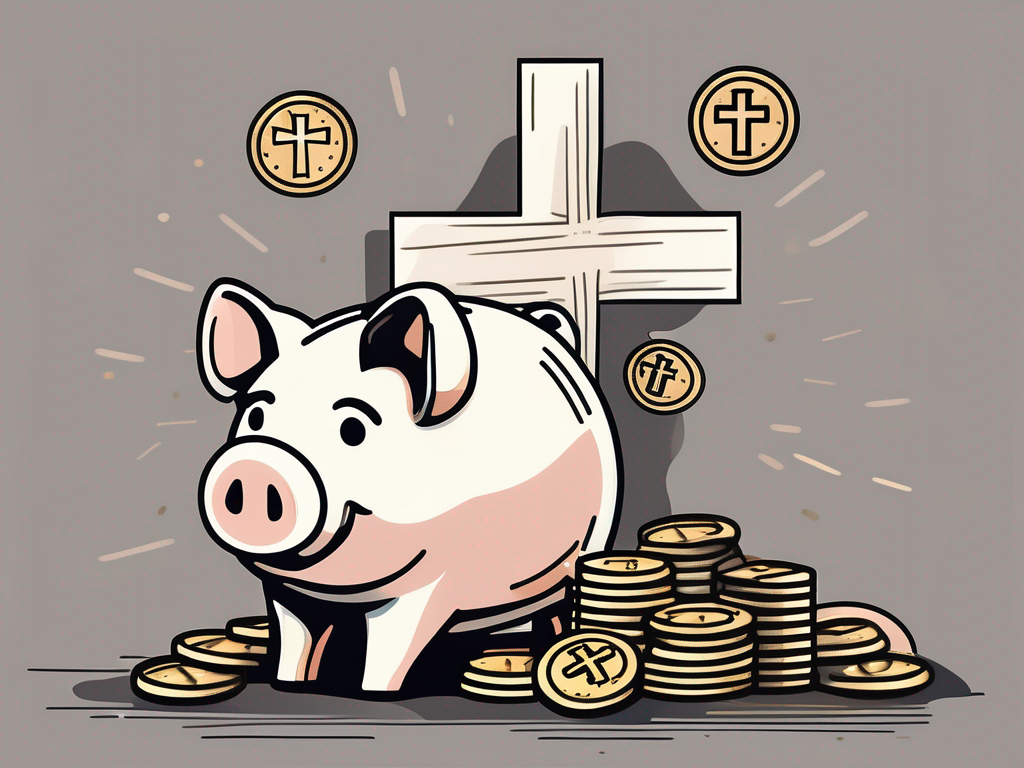In today’s materialistic world, the concept of greed is prevalent and often misunderstood. Many associate it with excessive wealth or an insatiable desire for possessions. However, to truly grasp the meaning of greed, we need to delve into its origins and explore its implications in both historical and modern contexts. By doing so, we can better understand its significance not only in our everyday lives but also from a biblical perspective.
Understanding the Concept of Greed
At its core, greed can be defined as an intense desire for more than what is necessary or deserved. It transcends mere ambition or aspiration, manifesting as an insatiable hunger for accumulation and possession. To comprehend the significance of greed, we must first examine its historical context.
The Historical Context of Greed
Throughout history, the pursuit of wealth and power has been a driving force behind societal and individual actions. Ancient empires crumbled due to the insatiable greed of their leaders, while explorers embarked on perilous journeys in search of fabled riches. Greed has shaped the course of human history in both positive and negative ways.
One notable example of the influence of greed in history is the fall of the Roman Empire. The emperors, driven by their insatiable desire for wealth and control, engaged in corrupt practices and exploited their subjects. This unchecked greed eventually led to the downfall of one of the greatest civilizations in history.
On the other hand, greed has also been a catalyst for exploration and innovation. During the Age of Discovery, explorers like Christopher Columbus and Ferdinand Magellan set sail in search of new trade routes and untold riches. While their motivations were undoubtedly driven by greed, their expeditions resulted in the exchange of knowledge, cultural enrichment, and the expansion of global trade.
Greed in Modern Society
In our present-day, materialistic society, the influence of greed is undeniable. The pursuit of financial success often overshadows other aspects of life, leading individuals to prioritize personal gain at the expense of their relationships, well-being, and societal responsibility. Consumerism fuels this greed, bombarding us with messages that promote the acquisition of more, bigger, and better things.
Moreover, the rise of social media has further exacerbated the culture of greed. People constantly compare their lives to the carefully curated highlight reels of others, fostering feelings of inadequacy and a relentless pursuit of material possessions. The constant need for validation and the fear of missing out drive individuals to accumulate more, perpetuating the cycle of greed.
However, it is crucial to distinguish between healthy ambition and toxic greed. While ambition can motivate individuals to pursue their goals and make positive contributions to society, unchecked greed can lead to moral decay, greed-based exploitation, and an unending cycle of discontent.
It is essential for individuals and society as a whole to reflect on the consequences of unchecked greed. By fostering a culture that values compassion, empathy, and sustainable growth, we can strive for a more balanced and fulfilling existence.
Biblical Interpretations of Greed
The Bible provides valuable insights into the nature of greed, offering guidance on how to navigate the perils of worldly desires. Greed, a powerful force that can consume individuals and societies, is a topic that the Bible addresses with wisdom and clarity.
Throughout the Old and New Testaments, various passages shed light on the consequences of greed and provide lessons on how to resist its allure. These teachings serve as a timeless reminder for believers to prioritize spiritual growth and cultivate a heart of generosity.
Old Testament References to Greed
Within the Old Testament, greed is often associated with dishonesty, oppression, and disregard for others. Prophets warned against the temptations of material wealth, emphasizing the importance of justice and compassion. One such cautionary tale is the story of Ahab and Naboth’s vineyard.
In this story, Ahab, the king of Israel, coveted Naboth’s vineyard and desired to possess it for himself. His greed led him to plot and scheme, eventually resulting in the unjust execution of Naboth. This tragic tale serves as a stark reminder of the destructive power of unchecked greed and the devastating consequences it can have on individuals and communities.
Furthermore, the book of Proverbs contains numerous verses that highlight the dangers of greed. Proverbs 28:25 warns, “A greedy man stirs up strife, but the one who trusts in the Lord will be enriched.” This verse underscores the correlation between greed and conflict, emphasizing the importance of trust in God’s provision rather than an insatiable desire for more.
New Testament Perspectives on Greed
In the New Testament, Jesus’s teachings shed light on the detrimental effects of greed. He warns against putting material possessions above spiritual growth and encourages a focus on inner wealth rather than tangible riches. Jesus’s parables often address the issue of greed, challenging his followers to examine their hearts and priorities.
One notable example is the story of the rich young ruler, found in the Gospel of Mark. This young man approached Jesus, seeking guidance on how to inherit eternal life. Jesus, knowing the man’s heart, instructed him to sell all his possessions and give the proceeds to the poor. However, the young ruler, unable to let go of his wealth, walked away sorrowful. This encounter serves as a powerful reminder that true discipleship requires surrendering worldly attachments, including the grip of greed.
Additionally, the apostle Paul addresses the issue of greed in his letters to various churches. In his letter to the Colossians, Paul writes, “Put to death, therefore, whatever belongs to your earthly nature: sexual immorality, impurity, lust, evil desires and greed, which is idolatry” (Colossians 3:5). This verse highlights the spiritual significance of greed, equating it to idolatry and emphasizing the need to eradicate it from our lives.
In conclusion, the Bible offers profound insights into the nature of greed and its consequences. Through cautionary tales, wise teachings, and thought-provoking parables, the Scriptures guide believers on a path of contentment, generosity, and spiritual growth. By heeding these lessons and seeking to align our hearts with God’s desires, we can resist the allure of greed and embrace a life of true abundance.
The True Nature of Human Desire
Understanding the true nature of human desire is essential in unraveling the complexities of greed. Human desire is a multifaceted phenomenon that encompasses various aspects of our lives, shaping our actions, motivations, and aspirations.
Desire is an integral part of human existence. It drives us to seek love, success, and fulfillment. From the moment we are born, we are driven by a natural inclination to desire. As infants, we desire nourishment, comfort, and affection. As we grow older, our desires evolve and expand, encompassing a wide range of experiences and achievements.
However, when desire becomes distorted and disconnected from our true values, it can morph into greed. Greed is an insatiable hunger for more, a relentless pursuit of material possessions, power, and status. It is a manifestation of desire gone awry, where the pursuit of self-interest overrides empathy and compassion.
The Psychology Behind Desire
Exploring the psychology behind desire provides valuable insights into its complexities. Desire arises from a combination of biological, psychological, and social factors. Biologically, our brains are wired to seek pleasure and avoid pain, which fuels our desires. Psychologically, our desires are shaped by our upbringing, experiences, and cultural influences. Socially, our desires are influenced by societal norms, expectations, and the desire for social acceptance.
The human capacity for desire is not inherently negative; it is how we navigate and prioritize our desires that shape our character. When desire aligns with our core values and contributes to our personal growth and the well-being of others, it can be a powerful force for positive change. However, when desire becomes excessive, selfish, and detached from our values, it can lead to destructive behaviors and a never-ending cycle of dissatisfaction.
Desire vs. Need: A Fine Line
Distinguishing between desire and need is crucial in combating greed. While we all have genuine needs for survival and well-being, greed arises when these needs morph into insatiable desires for more than what is necessary. Recognizing the difference allows us to cultivate contentment and focus on what truly matters.
Needs are essential for our physical and emotional well-being. They include basic necessities such as food, shelter, clothing, and healthcare. Needs are universal and fundamental to human survival. On the other hand, desires go beyond our basic needs and encompass our wants, aspirations, and ambitions. Desires are influenced by our personal preferences, societal influences, and cultural conditioning.
By understanding the fine line between desire and need, we can develop a more balanced approach to our desires. We can learn to differentiate between genuine needs that contribute to our well-being and desires that are driven by external pressures or societal expectations. This awareness empowers us to make conscious choices and prioritize our desires in a way that aligns with our values and promotes a more fulfilling and meaningful life.
The Consequences of Greed According to the Bible
The Bible highlights the profound consequences of unchecked greed in various aspects of life. Greed, a powerful force that can consume individuals, has far-reaching implications that extend beyond the material realm.
In addition to its material consequences, greed also carries significant spiritual implications. From a spiritual perspective, greed possesses the potential to estrange individuals from their true selves, others, and God. When one becomes consumed by greed, it can breed discontentment, selfishness, and a lack of compassion. This disconnect hinders our spiritual growth and connection with a higher power. Greed blinds us to the needs of others and prevents us from experiencing the true joy and fulfillment that comes from a selfless and compassionate life.
Moreover, the societal impact of greed is undeniable. Greed’s detrimental effects are not limited to the individual; they permeate society as a whole. The unscrupulous pursuit of wealth and power often leads to economic disparities, social injustice, and environmental degradation. When personal gain takes precedence over communal well-being, society suffers as a result.
Economic disparities, a consequence of greed, create a wide gap between the rich and the poor. This wealth inequality can lead to social unrest, as marginalized communities struggle to meet their basic needs while a select few amass unimaginable wealth. The Bible teaches us the importance of caring for the less fortunate and warns against the dangers of greed that perpetuate these disparities.
Social injustice is another consequence of unchecked greed. When individuals prioritize their own interests above the needs of others, it leads to unfair treatment and discrimination. Greed blinds us to the inherent worth and dignity of every human being, causing us to exploit and oppress others for personal gain. The Bible calls us to seek justice, love mercy, and walk humbly with our fellow human beings, reminding us that greed is antithetical to these principles.
Furthermore, the environment suffers greatly due to the consequences of greed. The unrelenting pursuit of wealth often comes at the expense of our natural resources. Greed drives individuals and corporations to exploit the earth’s finite resources without regard for the long-term consequences. Deforestation, pollution, and climate change are just some of the environmental issues exacerbated by greed. The Bible teaches us the importance of stewardship, reminding us that we are called to care for and protect the earth, not exploit it for personal gain.
In conclusion, the consequences of greed, as outlined in the Bible, are profound and far-reaching. From a spiritual perspective, greed hinders our connection with God and others, breeding discontentment and selfishness. Societally, greed leads to economic disparities, social injustice, and environmental degradation. Recognizing the destructive nature of greed is essential for personal and societal transformation, as we strive to live lives characterized by compassion, justice, and stewardship.
Overcoming Greed: Biblical Teachings
The Bible offers guidance on how to overcome the grip of greed and cultivate a life characterized by contentment, gratitude, and generosity.
The Role of Contentment and Gratitude
Fostering contentment and gratitude allows us to appreciate the blessings we have, rather than constantly yearning for more. Recognizing that true abundance comes from within enables us to find joy and satisfaction beyond material possessions.
Generosity as an Antidote to Greed
Generosity counters the self-centered nature of greed, instilling qualities of compassion, empathy, and kindness. By freely giving to others, we break free from the cycle of accumulating for personal gain alone and create a positive ripple effect in our communities.
In conclusion, understanding the biblical definition of greed is crucial in unraveling the true nature of human desire. Greed goes beyond a mere desire for wealth; it encompasses an insatiable hunger for accumulation, often at the expense of others. By exploring its historical and modern contexts, as well as biblical interpretations, we can recognize the detrimental consequences of unchecked greed. Understanding the psychology behind desire and distinguishing between genuine needs and excessive desires can help us navigate the thin line between ambition and greed. By embracing contentment, gratitude, and generosity, we can overcome greed’s grip and foster a more compassionate and balanced existence.












